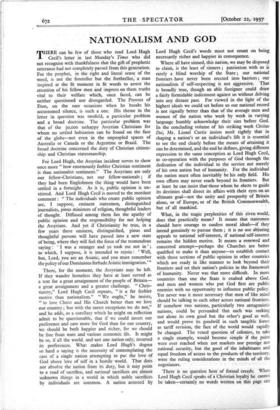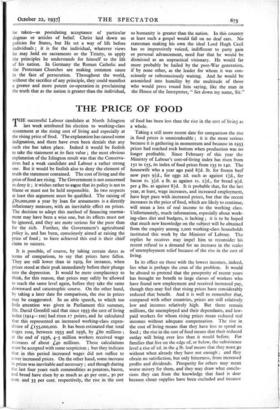NATIONALISM AND GOD
THERE can be few of those who read Lord Hugh Cecil's letter in last Monday's Times who did not recognise with thankfulness that the gift of prophetic utterance had not completely passed frOm this generation. For the prophet, in the right and literal sense of the word, is not the foreteller but the forthteller, a man inspired at the fit moment in fit words to arrest the attention of his fellow men and impress on them truths vital to their welfare which, once faced, can be neither questioned nor disregarded. The Provost of Eton, on the rare occasions when he breaks his accustomed silence, is such a one. His theme in the letter in question was twofold, a particular problem and a broad doctrine. The particular problem was that of the 30,000 unhappy Assyrian Christians for whom no settled habitation can be found on the face of the globe—not even in the unpeopled spaces of Australia or Canada or the Argentine or Brazil. The broad doctrine concerned the duty of Christian citizen- ship and Christian statesmanship.
For Lord Hugh, the Assyrian incident serves to show once more " how enormously feebler Christian sentiment is than nationalist sentiment." The Assyrians are only our fellow-Christians, not our fellow-nationals ; if they had been Englishmen the thing would have been settled in a fortnight. As it is, public opinion is. un- stirred. And Lord Hugh Cecil is moved to the mordant comment : " The individuals who create public opinion are, I suppose, eminent statesmen, distinguished journalists, pious ministers of religion, thoughtful leaders of thought. Diffused among them lies the apathy of public opinion and the responsibility for not helping the Assyrians. And yet if Christianity be true, in a few years these eminent, distinguished, pious and thoughtful persons will have passed into a new state of being, where they will feel the force of the tremendous saying : I was a stranger and ye took me not in ' ; to which, I suppose, it is intended to rejoin : Well, but, Lord, you are an Asiatic, and you must remember the policy of our Dominions forbade Asiatic immigration."
There, for the moment, the Assyrians may be left. If they wander homeless they have at least served as a text for a great arraignment of the people of Britain— a great arraignment and a greater challenge. " Chris- tianity," Lord Hugh Cecil repeats, " is a far feebler motive than nationalism." " We ought," he insists, " to love Christ and His Church better than we love our country ; but with the rarest exceptions we do not," and he adds, as a corollary which he might on reflection admit to be questionable, that if we could invert our preference and care more for God than for our country, we should be both happier and richer, for we should be free from wars and various economic ills. It might be so, if all the world, and sot one nation only, inverted its preferences. What makes Lord Hugh's dogma so hard a saying is the necessity of contemplating the case of a single nation attempting to put the love of God above love of self in a hostile world. That does not absolve the nation from its duty, but it may poirit to a road of sacrifice, and national sacrifices are almot unknown things in a world in which noble sacrifices by individuals are common. A nation arrested by Lord Hugh Cecil's words must not count on being necessarily richer and happier in consequence.
Where all have sinned, this nation, we may be disposed to claim, is the least of sinners ; patriotism with us is rarely a blind worship of the State ; our national frontiers have never been erected into. barriers; our nationalism if self-respecting is not aggressive. That is broadly true, though an able foreigner could draw a fairly formidable indictment against us without delving into any distant past. For viewed in the light of the highest ideals we could set before us our national record is not signally better than that of the average men and women of the nation who week by week in varying language humbly acknowledge their sins before God. In the concluding volume of his striking work Civitas Dei, Mr. Lionel Curtis insists most rightly that in shaping a nation's or an individual's life it is essential to see the end clearly before the means of attaining it can be determined, and the end he defines, giving different expression to the same conception as Lord Hugh Cecil, as co-operation with the purposes of God through the dedication of the individual to the service not merely of his own nation but of humanity. For the individual the nation must often inevitably be his only field. His own efforts may never reach beyond its frontiers. But at least he can insist that.those whom he elects to guide its destinies shall direct its affairs with their eyes on an ultimate goal—not the unity and prosperity of Britain alone, or of Europe, or of the British Commonwealth, but of all mankind.
What, in the tragic perplexities of this riven world, does that practically mean? It means that statesmen should have courage to confess moral ideals—if they intend genuinely to pursue them ; it is no use abjuring appeals to national self-interest, if national self-interest remains the hidden motive. It means a renewed and concerted attempt—perhaps the Churches are better qualified to make it than anyone—to establish contact with those sections of public opinion in other countries which are ready in like manner to look beyond their frontiers and set their nation's policies in the framework of humanity. Never was that more difficult. In more countries than one the State is exalted above God, and men and women who put God first are public enemies with no opportunity to influence public policy. Yet never was it more necessary that men of like mind should be talking to each other across national frontiers. If somehow two nations, particularly two antagonistic nations, could be persuaded that each was seeking not alone its own good but the other's good as well, and would prove its goodwill in such tangible forms as tariff revision, the face of the world would rapidly be changed. The vexed question of colonies, to take a single example, would become simple if the point were ever reached when not markets nor prestige nor national security, but the, good of the inhabitants and equal freedom of access to the products of the territory, were the ruling considerations in the minds of all the negotiators.
There is no question here of formal creeds: When Lord Hugh Cecil speaks of a Christian loyalty he cannot be taken—certainly no words written on this page can be taken—as postulating acceptance of particular dogmas or articles of belief. Christ laid down no policies for States, but He set a way of life before individuals ; it is for the individual, whatever views he may hold on sacraments or the Trinity, to apply the principles he understands for himself to the life of his nation. In Germany the Roman Catholic and the Protestant Churches are making common cause in the face of persecution. Throughout the world, without the sacrifice of any principle, they could manifest a greater and more potent co-operation in proclaiming the truth that as the nation is greater than the individual, so humanity is greater than the nation. In this country at least such a gospel would fall on no deaf ears. No statesman making his own the ideal Lord Hugh Cecil has so impressively voiced, indifferent to party gain or personal advancement, need fear that he would be dismissed as an unpractical visionary. He would far more probably be hailed by the post-War generation, if by none other, as the leader for whom it was con- sciously or subconsciously waiting. And he would be astonished into humility by the multitude of those who would press round him saying, like the man in the House of the Interpreter, " Set down my name, Sir."































































 Previous page
Previous page